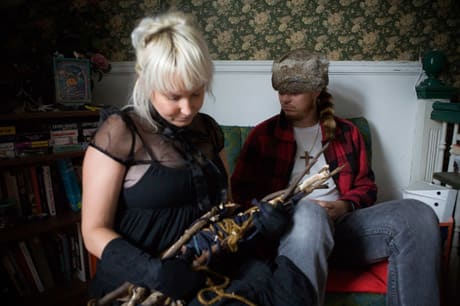Brimming with mystery, Timber Timbre is the enigmatic brainchild of Toronto's Taylor Kirk, whose unique brand of haunted, folk-blues is fully realized on his eponymous new album. Though previous otherworldly records (2006's Cedar Shakes and 2007's Medicinals) made him a cult favourite, Kirk's been purposefully elusive, rarely playing live and often distorting his image in Timber Timbre photographs.
"I suppose I've just been more interested in creating an entity," he explains. "Not a persona, but a front for the group rather than revealing that it's just a one-person project. I find that it ends up, inevitably, being a personal thing and that separation seems important."
Muddying the path further, Kirk blurs the temporal domain of Timber Timbre, gravitating toward 20th century folk while conveying contemporary isolation. A proponent of prepared found sounds and lo-fi recording, Kirk infuses his work with makeshift murkiness, drenching his voice in reverb and accompanying it with soulful, off-kilter tones.
"I like evil-sounding music; I've tried to write happier, more positive songs and they all suck," he says. "It's like an exorcism really - getting the bad stuff out. I'm also interested in field recordings and I had this idea of inserting my recordings, not in current-day contexts, but in canons that already exist."
Despite his out-of-time, loner compulsions, Kirk sought connection for his brilliant new record. Rather than recording home alone, as he'd done previously, he entered a studio with producer Chris Stringer and sought help from folks in Forest City Lovers and Bruce Peninsula, all of which led to the most richly textured Timber Timbre release yet. "It's just more enjoyable really," Kirk says. "It's kind of gross to me that I'd finish a recording and be responsible for every single sound. You can only take it so far on your own."
"I suppose I've just been more interested in creating an entity," he explains. "Not a persona, but a front for the group rather than revealing that it's just a one-person project. I find that it ends up, inevitably, being a personal thing and that separation seems important."
Muddying the path further, Kirk blurs the temporal domain of Timber Timbre, gravitating toward 20th century folk while conveying contemporary isolation. A proponent of prepared found sounds and lo-fi recording, Kirk infuses his work with makeshift murkiness, drenching his voice in reverb and accompanying it with soulful, off-kilter tones.
"I like evil-sounding music; I've tried to write happier, more positive songs and they all suck," he says. "It's like an exorcism really - getting the bad stuff out. I'm also interested in field recordings and I had this idea of inserting my recordings, not in current-day contexts, but in canons that already exist."
Despite his out-of-time, loner compulsions, Kirk sought connection for his brilliant new record. Rather than recording home alone, as he'd done previously, he entered a studio with producer Chris Stringer and sought help from folks in Forest City Lovers and Bruce Peninsula, all of which led to the most richly textured Timber Timbre release yet. "It's just more enjoyable really," Kirk says. "It's kind of gross to me that I'd finish a recording and be responsible for every single sound. You can only take it so far on your own."
